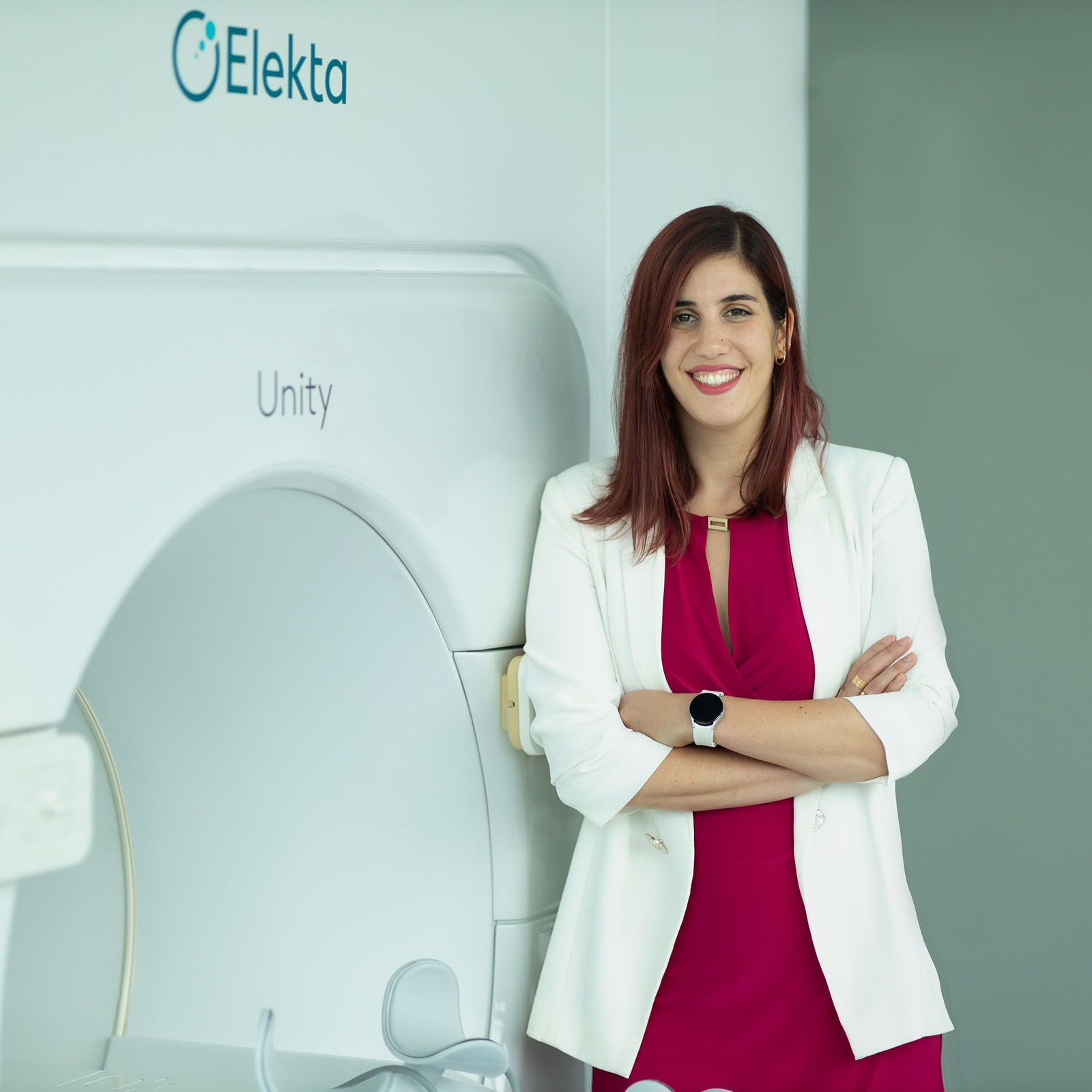We contribute to a sustainable future
We are working to realize our vision of a world where everyone has access to the best cancer care. We aim to deliver on our strategy to drive maximum positive impact and create sustainable future for society, while also working to minimize any negative impacts on the society, environment, people and human rights.

Our approach to sustainability is guided by Agenda 2030 and UN’s SDGs. Elekta contributes to nine of the 17 SDGs.
Today, there are large structural differences in cancer care. Low- and middle-income countries are generally underserved in terms of treatment capacity while socioeconomically weaker groups have less access to treatment and worse outcomes even in more mature markets. Improving access is at the core of our business strategy. The strategy covers innovation that improves outcomes for patients and enables more efficient delivery of treatments, service and predictive maintenance. In addition, it covers initiatives that drive global adoption, such as working with governments to improve reimbursements, access to training and customer financing. While improving access is our most significant positive impact on society, we are mindful of our wider social and environmental impact and make efforts to ensure that we conduct our business ethically and responsibly.
The aim of our sustainability agenda is to ensure that we build a sustainable business that can thrive over the long term in order to continue to drive positive social impact.
Environment
Elekta strives to maximize the positive social impact of our products and services while minimizing environmental impact across our entire value chain. This commitment is guided by our Global Environmental Policy.
We are committed to decoupling growth from environmental impact by setting ambitious targets to reduce greenhouse gas emissions, improving pollution management and exploring circular initiatives. We aim to lower emissions per cancer treatment course, driving more environmentally efficient cancer care.
Elekta is integrating environmentally conscious design principles throughout the product lifecycle and operates a take-back program for selected components. In our supply chain, we focus on optimizing packaging and logistics, while within our own operations we are transitioning to 100% renewable electricity and targeting zero waste to landfill at our four main sites.


Social
Elekta drives access to cancer care in different ways in connection to our products and services. We build expertise and serve as a partner to decision makers across the world in building sustainable healthcare systems. We also innovate to improve efficiency and utilization, train clinicians and strengthen our local presence. We are proud of the newly established Elekta Foundation, see elektafoundation.com.
We care for people across our value chain. Our approach to people is defined in our Global People & Human Right Policy. As an employer, we work to provide an inspiring, diverse, inclusive and safe place to work. We drive sustainable sourcing efforts and engage with suppliers to promote human rights and safe working conditions in our supply chain, and we work diligently to ensure the highest quality and safety standards of our products.
Governance
Elekta has a robust compliance program in place to detect, prevent and mitigate unlawful and unethical behavior in all our business activities. With most of our sales going through public tenders and our regular close interactions with healthcare professionals, we have developed detailed guidelines so that our conduct can be free from even the suggestion of improper influence. Our approach is defined in our global Anti-Bribery and Corruption Policy.

Environmental Calculations
Energy and emissions
Elekta follows the Greenhouse Gas (GHG) Protocol Corporate Accounting and Reporting Standard for it’s carbon accounting method and reports GHG emissions as carbon dioxide equivalents (CO2e). Elekta uses an operational-control approach to define organizational boundary and a market-based approach for scope 2 emissions. Elekta does not offset emissions.
Elekta has collected 11 months of activity data and estimated the 12th month if data is provided by an external vendor. Data is estimated for smaller sites and locations where no data is reported. Product-related emissions are estimated based on order data.
Emission factors are sourced from a mix of publicly available databases and subscription-based resources, including IEA, AIB, DEFRA and Exiobase.
Elekta’s CO2e base year is fiscal year 2021/22.
Scope 1 (direct emissions)
Scope 1 emissions are direct GHG emissions from owned and controlled sources that a company generates while performing its business activities. Elekta’s scope 1 emissions arise from fuel use within owned and leased vehicles (mobile combustion) as well as gaseous fuel used for heating in office premises (stationary combustion) and SF6 gas leakages in manufacturing facilities (fugitive emissions). Calculations are based on actual consumption figures (activity data) collected internally or from Elekta’s suppliers where applicable.
Scope 2 (indirect emissions)
Scope 2 emissions are the indirect GHG emissions generated by the production of purchased energy. Elekta’s scope 2 emissions arise from electricity and district heating consumption within Elekta’s offices and manufacturing facilities. Actual consumption figures (activity data) of electricity and heating usage are collected for all Elekta sites with more than 50 employees. The remaining energy consumption is estimated using an energy proxy per employee.
Scope 3 (other indirect emissions)
Scope 3 emissions are all other indirect GHG emissions that occur in the value chain of a company and are not already included within scope 1 or 2. These emissions are a consequence of the company’s business activities but occur from sources the company does not own or control. Elekta calculates emissions from scope 3 categories 1-7 and 11-12 of the GHG Protocol. Other available scope 3 categories are deemed not relevant for Elekta.
- Purchased goods and services (category 1) and capital goods (category 2): Emissions from these categories are derived by applying spend-based method where emissions are calculated by mapping each supplier based on its sector to an environmentally extended input-output analysis, EEIO.
- Fuel- and energy-related activities not included in scope 1 or 2 (category 3): Well-to-tank emissions are calculated based on the used volumes per fuel type and the kWh for energy per country.
- Upstream transportation and distribution (category 4): The majority of transportation data within this category is available as activity data and emissions are provided directly by Elekta’s logistic suppliers (well-to-wheel assessment). For the remaining transportation activities, the emissions are appropriately extrapolated based on the available activity data. Emissions from warehousing are based on spend data.
- Waste generated in operations (category 5): The calculations are based on activity data collected from suppliers for sites with more than 50 employees. The remaining volume of generated waste is estimated using a waste proxy per employee.
- Business travel (category 6): The majority of business travel emissions calculations are based on activity data provided by Elekta’s travel suppliers and the remaining data has been calculated using spend data.
- Employee commuting (category 7): Emissions are estimated based on an employee survey considering the distance traveled as well as the mode of commuting. The results are extrapolated to cover the whole workforce. The last survey was conducted in spring 2024.
- Use of sold products (category 11): Emissions arising from this category are assessed by matching the estimated energy use over the full lifetime of Elekta’s products and software to emissions factors of the countries to which products were ordered. This category also contains estimated emissions from SF6 gas used in some of our products (refrigerant emissions). All calculations are based on number of ordered products in the reporting period.
- End-of-Life (EoL) treatment of sold products (category 12): Emissions from this category include an assessment of key materials and packaging waste by weight which are matched with conservative (highest emitting) EoL scenario assumptions since not full transparency is available on how our products or their materials are treated at the end of life at customer sites.
| GHG Category | Description | Relevant for Elekta? | Example | Data source |
|---|---|---|---|---|
SCOPE 1 EMISSIONS (direct) | ||||
| Company facilities | Heating and cooling of owned/controlled facilities | Yes | Gas heating | Activity data |
| Factory leakage | Fugitive emissions from owned/controlled facilities | Yes | SF6 leakage in factory and R&D/training facilities | Activity data |
| Company vehicles | Emissions from Elekta owned/controlled vehicles | Yes | Elekta company cars (incl. long-term leased cars) | Activity data and extrapolated data |
SCOPE 2 EMISSIONS (indirect) | ||||
| Purchased energy | Electricity, steam, heating, and cooling consumption across all sites (non-renewable and renewable) | Yes | Electricity and district heating | Activity data and extrapolated data |
UPSTREAM SCOPE 3 EMISSIONS (other indirect) | ||||
Category 1 | ||||
| Purchased goods & services | All bought components or services not captured in other categories | Yes | Direct components, sources, IT, third party components | Spend data |
Category 2 | ||||
| Capital goods | Purchased CAPEX goods | Yes | Investments in large production machinery | Spend data |
Category 3 | ||||
| Fuel- & energy-related activities | Fuel and energy activities not covered in scope 1 or scope 2 | Yes | Upstream emissions of fuel and energy | Activity data and extrapolated data |
Category 4 | ||||
| Upstream transportation and distribution | All inbound and outbound transportation | Yes | Supplier shipments to/from Elekta’s facilities | Activity data and spend data |
Category 5 | ||||
| Waste generated in operations | Disposal and treatment of waste generated in Elekta’s operations | Yes | Waste services based on activity data | Activity data and extrapolated data |
Category 6 | ||||
| Business travel | Transportation of employees for business-related activities | Yes | Air travel, train, taxi and private car mileage reimbursements | Activity data and spend data |
Category 7 | ||||
| Employee commuting | Transportation of employees between their homes and their worksites | Yes | Commuting (car, public transport, etc.) | Employee survey |
Category 8 | ||||
| Upstream leased assets | Operation of assets leased by the reporting company (unless already covered in Scope 1 & 2) | No | ||
DOWNSTREAM SCOPE 3 EMISSIONS (other indirect) | ||||
Category 9 | ||||
| Downstream transportation and distribution | Transportation and distribution of products to end customers that is not paid for by Elekta | No | ||
Category 10 | ||||
| Processing of sold products | Customers’ processing of our products | No | ||
Category 11 | ||||
| Use of sold products | Emissions from the end users’ utilization of product across its lifecycle | Yes | Energy consumption of equipment and software (physical servers) and SF6 emissions | Elekta’s assumptions and number of ordered products |
Category 12 | ||||
| EoL treatment of sold products | Waste disposal and treatment of products sold | Yes | Decommissioning of products and EoL material handling, product packaging waste | Elekta’s assumptions and number of ordered products |
Category 13 | ||||
| Downstream leased assets | Operations of assets owned by the company and leased to other entities | No | ||
Category 14 | ||||
| Franchises | Franchise operations | No | ||
Category 15 | ||||
| Investments | Operation of investments (including equity and debt and project finance), not included in scope 1 or scope 2 | No | ||
Materials
Non-renewable materials include metals, composites and ceramics, electronics and other materials used in the manufacturing of Elekta’s products. Renewable materials include materials used in transport and packaging such as wood and cardboard.
The data compiled is based on material types and composition of standard products and may exclude certain parts. It covers neurotherapy (Leksell Gamma Knives), radiotherapy (linacs), MR-guided radiotherapy (MR-linacs) and brachytherapy (afterloaders) products, that were ordered during the fiscal year. In previous years, Elekta has reported by number of shipped units, but from fiscal year 2021/22, Elekta has reported by number of ordered units for materials used.
The [de/increased] use of materials is a result of [de/increased] number of ordered units during the fiscal year.
Waste
Waste data includes data from 11 Elekta sites.
Meet our employees
Would you like to learn more about our work and how our employees are driving the sustainability agenda? Read our employee stories.
Environmental impact
Social impact
Governance
ESG Library
Annual Sustainability Reports
Social
- People and Human Rights Policy
- Elekta Modern Slavery and Human Trafficking Statement 2024/25 – ( French version )
- Elekta Modern Slavery and Human Trafficking Statement 2023/24 – ( French version )
- Elekta Modern Slavery and Human Trafficking Statement 2022/23
- Elekta Modern Slavery and Human Trafficking Statement 2021/22
- Elekta Modern Slavery and Human Trafficking Statement 2020/21
- Elekta Modern Slavery and Human Trafficking Statement 2019/20
- Elekta Modern Slavery and Human Trafficking Statement 2018/19
- Elekta Modern Slavery and Human Trafficking Statement 2017/18
Elekta quality standards for clinical investigation
The Elekta quality manual with respect to clinical investigations includes that Elekta sponsored interventional clinical trials for Elekta medical devices shall be compliant to ISO 14155 Clinical investigation of medical devices for human subjects — Good clinical practice as well as the EU Medical device regulation and mdcg guidance related to clinical evidence and as such shall include for example:
- Prior registration of all clinical trials in credible and publicly available databases
- Publication of all trial results in credible databases or peer reviewed journals
- Publication of results of terminated trials
- Commitment to specific timeframe for results disclosure
- Raw data availability to third parties
- Commitment to conduct trials in an ethical manner
- Commitment to adhere to international best practice guidelines
- Commitment to adhere to other international codes or principles
- Commitment to regular monitoring of outsourced trials
- Managerial responsibility for ethical conduct in clinical trials
- Independent ethics committee with authority to approve, modify or stop trials
- Risk/impact assessment before any trial begins
- Procedure to obtain participants' free, prior and informed consent
- Training and awareness programmes for employees involved in trials (current employees have undergone GCP training)
- Commitment to conduct trials only where the investigational product will be marketed
- Grievance mechanisms for clinical trial participants
- Regular monitoring of on-going clinical trials
- Public reporting on monitoring outcomes, violations in clinical trials and corrective action
Living our values
The ethical principles in our Code of Conduct are all cornerstones in building a sustainable company. Our sustainability efforts and policies are further guided by leading global standards and principles such as the following:
- the UN Global Compact and its ten principles
- the OECD Guidelines for Multinational Enterprises and its associated due diligence guidance for responsible business conduct
- the UN Guiding Principles on Business and Human Rights
- the Universal Declaration of Human Rights
- the ILO Declaration on Fundamental Principles and Rights at Work and the precautionary principle.







